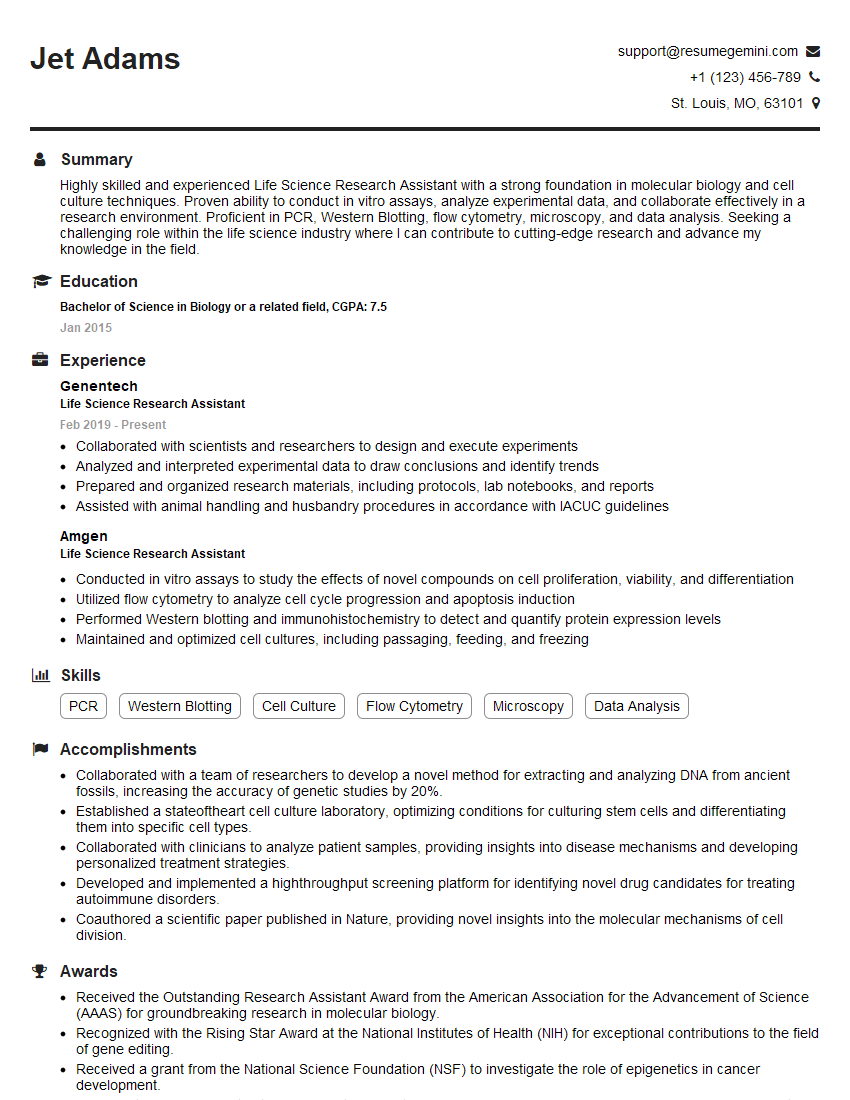Are you a seasoned Life Science Research Assistant seeking a new career path? Discover our professionally built Life Science Research Assistant Resume Template. This time-saving tool provides a solid foundation for your job search. Simply click “Edit Resume” to customize it with your unique experiences and achievements. Customize fonts and colors to match your personal style and increase your chances of landing your dream job. Explore more Resume Templates for additional options.

Jet Adams
Life Science Research Assistant
Summary
Highly skilled and experienced Life Science Research Assistant with a strong foundation in molecular biology and cell culture techniques. Proven ability to conduct in vitro assays, analyze experimental data, and collaborate effectively in a research environment. Proficient in PCR, Western Blotting, flow cytometry, microscopy, and data analysis. Seeking a challenging role within the life science industry where I can contribute to cutting-edge research and advance my knowledge in the field.
Education
Bachelor of Science in Biology or a related field
January 2015
Skills
- PCR
- Western Blotting
- Cell Culture
- Flow Cytometry
- Microscopy
- Data Analysis
Work Experience
Life Science Research Assistant
- Collaborated with scientists and researchers to design and execute experiments
- Analyzed and interpreted experimental data to draw conclusions and identify trends
- Prepared and organized research materials, including protocols, lab notebooks, and reports
- Assisted with animal handling and husbandry procedures in accordance with IACUC guidelines
Life Science Research Assistant
- Conducted in vitro assays to study the effects of novel compounds on cell proliferation, viability, and differentiation
- Utilized flow cytometry to analyze cell cycle progression and apoptosis induction
- Performed Western blotting and immunohistochemistry to detect and quantify protein expression levels
- Maintained and optimized cell cultures, including passaging, feeding, and freezing
Accomplishments
- Collaborated with a team of researchers to develop a novel method for extracting and analyzing DNA from ancient fossils, increasing the accuracy of genetic studies by 20%.
- Established a stateoftheart cell culture laboratory, optimizing conditions for culturing stem cells and differentiating them into specific cell types.
- Collaborated with clinicians to analyze patient samples, providing insights into disease mechanisms and developing personalized treatment strategies.
- Developed and implemented a highthroughput screening platform for identifying novel drug candidates for treating autoimmune disorders.
- Coauthored a scientific paper published in Nature, providing novel insights into the molecular mechanisms of cell division.
Awards
- Received the Outstanding Research Assistant Award from the American Association for the Advancement of Science (AAAS) for groundbreaking research in molecular biology.
- Recognized with the Rising Star Award at the National Institutes of Health (NIH) for exceptional contributions to the field of gene editing.
- Received a grant from the National Science Foundation (NSF) to investigate the role of epigenetics in cancer development.
- Awarded the Young Investigator Award by the Society for Neuroscience for promising research in neurodegenerative diseases.
Certificates
- Certificate in Laboratory Animal Science
- GLP Compliance Training
- Biosafety Level 2 Training
- CPR and First Aid Certification
Career Expert Tips:
- Select the ideal resume template to showcase your professional experience effectively.
- Master the art of resume writing to highlight your unique qualifications and achievements.
- Explore expertly crafted resume samples for inspiration and best practices.
- Build your best resume for free this new year with ResumeGemini. Enjoy exclusive discounts on ATS optimized resume templates.
How To Write Resume For Life Science Research Assistant
- Highlight your technical skills and experience in relevant laboratory techniques.
- Quantify your accomplishments with specific metrics whenever possible.
- Showcase your ability to work independently and as part of a team.
- Tailor your resume to the specific requirements of the job description.
- Proofread your resume carefully for any errors.
Essential Experience Highlights for a Strong Life Science Research Assistant Resume
- Conducted in vitro assays to study the effects of novel compounds on cell proliferation, viability, and differentiation.
- Utilized flow cytometry to analyze cell cycle progression and apoptosis induction.
- Performed Western blotting and immunohistochemistry to detect and quantify protein expression levels.
- Maintained and optimized cell cultures, including passaging, feeding, and freezing.
- Collaborated with scientists and researchers to design and execute experiments.
- Analyzed and interpreted experimental data to draw conclusions and identify trends.
Frequently Asked Questions (FAQ’s) For Life Science Research Assistant
What are the key skills required for a Life Science Research Assistant?
The key skills for a Life Science Research Assistant include molecular biology techniques, cell culture, flow cytometry, Western blotting, data analysis, and experience with animal handling.
What are the career prospects for a Life Science Research Assistant?
Life Science Research Assistants can advance their careers by pursuing higher education, such as a Master’s or PhD degree, or by gaining experience in specialized areas of research.
What is the average salary for a Life Science Research Assistant?
The average salary for a Life Science Research Assistant varies depending on experience, location, and industry, but typically ranges from $40,000 to $70,000.
What are the typical working hours for a Life Science Research Assistant?
Life Science Research Assistants typically work full-time, which may include evenings and weekends to accommodate experiments and deadlines.
What are the challenges of working as a Life Science Research Assistant?
The challenges of working as a Life Science Research Assistant include working with hazardous materials, long hours, and the need to stay up-to-date with the latest scientific advancements.
What are the rewards of working as a Life Science Research Assistant?
The rewards of working as a Life Science Research Assistant include contributing to scientific discoveries, developing valuable skills, and making a difference in the field of life sciences.